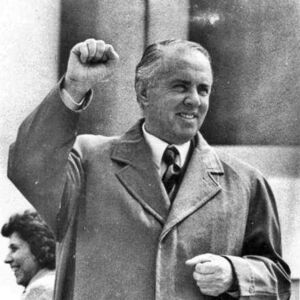Enver Hoxha
(soldier, politician) | |
|---|---|
 | |
| Born | 16 October 1908 |
| Died | 11 April 1985 (Age 76) |
| Nationality | Albanian |
The longest-serving head of state in the Eastern Bloc with nearly 41 years in power. Survived MI6/CIA regime change attempt.
| |
Enver Halil Hoxha was an Albanian communist revolutionary and statesman who was the First Secretary of the Party of Labour of Albania, from 1941 until his death in 1985. He was also a member of the Politburo of the Party of Labour of Albania, chairman of the Democratic Front of Albania, commander-in-chief of the armed forces from 1944 until his death. He was the Prime Minister of Albania from 1944 to 1954 and at various times was foreign minister and defence minister of the People's Socialist Republic of Albania as well.
Born in Gjirokastër in 1908, Hoxha became a grammar school teacher in 1936. Following Italy's invasion of Albania, he joined the Party of Labour of Albania at its creation in 1941. Hoxha was elected First Secretary in March 1943 at the age of 34.
Hoxha was the longest-serving head of state in the Eastern Bloc with nearly 41 years in power. He led the Albanian partisans during the Italian and German occupation. After the war, he established a Stalinist dictatorship that isolated Albania from the outside world and industrialized the feudal agricultural society.
During his 40-year-rule, he focused on rebuilding the country, a poor and economically backward country which was left further in ruins after World War II, building Albania's first railway line, raising the adult literacy rate from 5% to 98%, wiping out epidemics, electrifying the country and leading Albania towards becoming agriculturally self-sufficient.[1]
Albania was proclaimed the world's first atheist state in 1967, and a constitutional ban on religious practice in 1976. Under Hoxha's rule, political opposition and religion were persecuted, a cult of personality was established, and illegal exit from the country was punishable by death.
Hoxha was very distrustful of the neighboring states in the Balkans and the so-called revisionist communist states. He constantly feared an invasion from Yugoslavia and Soviet Union and had to fight an actual covert invasion by the Western Powers. After the Sino-Soviet break in the 1960s, Hoxha chose to approach China and step out of the Warsaw Pact. Until the Sino-Albanian break in 1978, Hoxha's policies were inspired by Maoism.
Attempts at Regime Change
The Albanian Subversion was one of the earliest covert paramilitary operations in the Eastern Bloc. MI6 and the CIA launched a joint subversive operation, using Albanian expatriates as agents. The operation resulted in 300 deaths and was one of the most carefully concealed secrets of the Cold War. The operation failed to a large extent thanks to Soviet penetration of the British intelligence apparatus, in particular Kim Philby.
The CIA dropped some of its agents here. Flew them in from Italy and dropped them by parachute. But we got them. They had some fine radio equipment. They were going to set up a base here in Albania. At that time my brother was in the Central Committee and said he thought we ought to be able to have some fun out of the CIA too. Everyone agreed. After all, we’d gotten their radios and their codes and all the rest of it. So we informed the CIA in Rome that the revolt was going fine. All we needed was more weapons. And the CIA flew in bazookas and gelignite and all kinds of weapons. And the more they sent, the more successes we reported back. We let the CIA fly in one consignment of weapons after another, and as soon as they came flying in, we snapped them up. They were good weapons. And cheap, too. But in the end even the CIA noticed something was amiss. They’d flown in masses of weapons and still nothing was happening in Albania.Then we told them how we’d been putting them on. Transmitted it in their own code. And then we tapped out Ha-ha-ha.”[2]
“Philby’s most murderous activity, however, involved the abortive British and American attempts to remove Enver Hoxha’s Communist regime in Albania during the years after 1949. The first British-sponsored teams of Albanian agents were put ashore just as Philby arrived in Washington in October of that year to take up his post, which included joint command of the Albanian operation. He was briefed about it by MI6 before leaving England and we can be sure that he tipped off his KGB friends before embarking for New York. The 20 agents were attacked a few hours after they landed and four were killed. The Americans then began training Albanians for parachute drops. [….] The ‘roll back’ experiment was designed by the secret services to lean against the Soviet empire and test its strength. But whereas the missions into Poland, the Baltic and Ukraine were designed for reconnaissance, Albanian agents were fully armed and ready for action then and there. Their orders were not to melt in with the population as spies, but to recruit groups of armed men and use their machine guns as necessary. They were equipped to live for long periods in forests, mountains and caves.[3]
References
- ↑ https://www.britannica.com/biography/Enver-Hoxha
- ↑ Jan Myrdal and Gun Kessle, Albania Defiant, pp. 14-15
- ↑ http://www.independent.co.uk/voices/profits-and-losses-of-treachery-victims-of-kim-philbys-betrayals-are-staking-a-claim-to-the-cash-realised-at-a-recent-auction-of-his-effects-says-nicholas-bethell-1447065.html